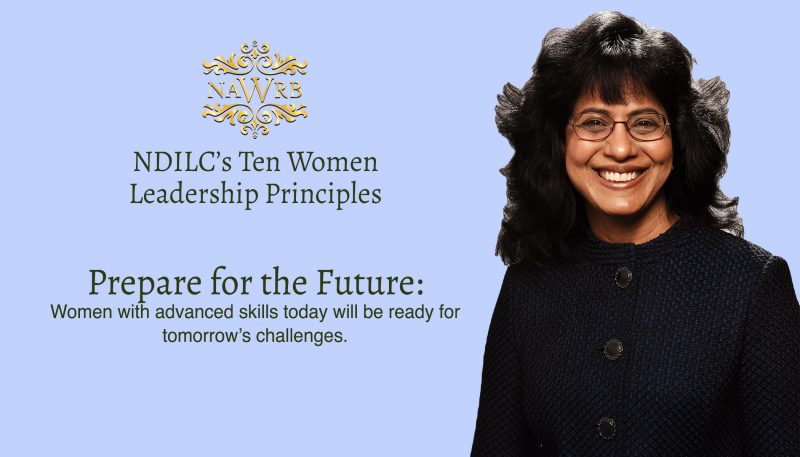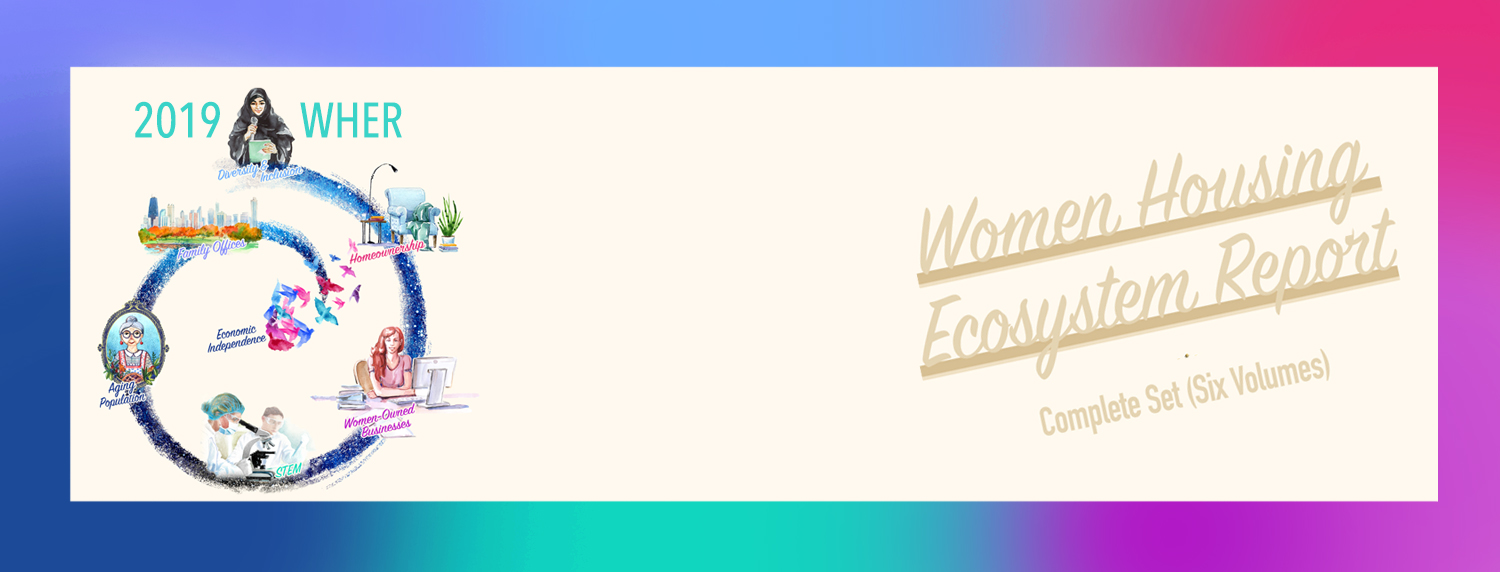
NAWRB’s Diversity & Inclusion Leadership Council (NDILC) introduced their Ten Women Leadership Principles in 2020, which they collectively created to help women in the workforce become more effective leaders at any stage of their careers, and empower other women to reach their full potential. This is a universal guide for all levels of leadership, and any woman can benefit from applying them. This week, NDILC presents the ninth principle, “Prepare for the Future” shared with a personal story by NDILC Member Dr. Chitra Dorai, AI Scientist, Founder & CEO, AmicusBrain.
In the upcoming weeks, each of these principles will be presented in detail with a personal message from an NDILC member about her experiences applying these principles to her professional and personal life. To learn more about the NDILC, please visit www.NAWRB.com/NDILC/.
Women Leadership Principle #9: Prepare for the Future by Dr. Chitra Dorai
Prepare for the Future: Women with advanced skills today will be ready for tomorrow’s challenges.
The harsh truth from the latest report from the World Economic Forum, WEF (https://www.weforum.org/
Gender parity is all about closing the gender gap that persists in access to Economic Participation and Opportunity, Educational Attainment, Health and Survival and Political Empowerment — the four critical dimensions used by WEF to track and benchmark progress made by countries across the globe.
Too wide to bridge is the gender gap in economic participation. What stands in the way of attaining economic gender parity? Among a number of challenges that slow down making progress, women’s under presentation in emerging roles that show the highest wage growth is a big one. Obviously technology roles that require advanced skills also provide one of the best ways to increased economic opportunity. There are other job roles requiring advanced skills as entrepreneurs and business owners that pave the path to prosperity. Statistics are rife about the deteriorating numbers in terms of women’s participation in STEM fields. Only 15% of engineers are women!
To deal with the rapidly changing, increasingly automated world, women need to focus on acquiring advanced skills by reskilling or upskilling. Learning advanced skills that matter today and beyond is critical in order to take advantage of the opportunities for wage growth and increased access to capital. Women with advanced skills of today will then be able to shape the future and be the future.
Check out Dr. Chitra Dorai on the Know the Rules of the Game Podcast: Defining the Future – Click here
NDILC’s Ten Women Leadership Principles
- Acknowledge Trailblazers: Know and learn from the women who came before you. We are all standing on the shoulders of giants: “So, what does a trailblazer even mean? Defined in the formal context, it is a person who blazes a trail for others to follow through unsettled country or wilderness; pathfinder; a pioneer in any field of endeavor; a vigorous independent; a person who is the first to do something that other people do later. Implied in this definition is the fact that these people are leaders, risk-takers, and are not afraid to push boundaries.” Read More.
- Keep Achieving: Effective leaders always keep learning. There is always something to learn and improve upon: “Achieving. Learning. Growing. Changing…all words that are used very often to tell us what we should be doing and what we must be doing in order to survive and be effective in today’s world. No one would debate the need for continuous learning and growth. Information continues to bombard us from every angle, but is that really knowledge?” Read More.
- Believe: Whatever the mind can conceive, it can achieve. Believe: “Think and Grow Rich is not about money. Does it seem out of place or sorts to reference a book whose title suggests financial aspirations during a once in a century pandemic when everyone is thinking about safety and survival instead of personal growth?” Read More.
- Pass the Torch: Give opportunities to future generations of women. Your legacy will be the people you help along the journey: “Doesn’t everyone want a legacy? A reason to be remembered? What do you want to be remembered for? As most people mature in their lives, they start to realize that their relationships, and specifically the people they have helped along the way, are more important than material things.” Read More.
- Know Yourself: Be authentic and lead in a way that is true to you. Own your unique talents and strengths, and empower those around you: “Authentic leadership is grounded in who you are not who you want to be or who you think you should be. This profoundly shapes how you act and what you accomplish. Authentic leadership empowers you to draw on your strengths to bring out the best in others.” Read More.
- Speak Out: Unconscious bias is present, but ignoring it only perpetuates it. Take a stand and speak out: “How many times should it feel comfortable not to say something when you see unconscious bias? Never! Until recently, most of us were all consumed in catching a flight, running the household from afar, postponing our health checkups, being briefed from one meeting to the next, and fitting in a bite to eat as part of our work agenda.” Read More.
- Listen: Never assume anything about anyone. Everyone has their own story that makes them who they are: To truly “LISTEN” is one of the most powerful words in this decade. In 2017 at NAWRB’s Annual Conference, Marcia Davies was the moderator for the Women’s Trade Associations Power Lunch, and through her questioning, “Listen” became my mantra on how to improve the narrative.” Read More.
- Be Present: Sharing your time is one of the most valuable gifts you can give. Do it with intention by truly being present. Staying in the present tense can be difficult, we have more distractions than ever, especially with technology, having so much of your world on your phone. The more you stay present the better you will get at it. It is excellent for your overall health and the quality of your relationships. In leadership, people follow leaders they trust and you cannot build trust without a good relationship. Read More.
- Prepare for the Future: Women with advanced skills today will be ready for tomorrow’s challenges. Learning advanced skills that matter today and beyond is critical in order to take advantage of the opportunities for wage growth and increased access to capital. Women with advanced skills of today will then be able to shape the future and be the future
- Lead by Example: Inclusion isn’t enough. Press for parity and strive for excellence in everything.
Stay tuned for other articles that will expound on each of these principles to assist women professionals in applying them to their individual goals.
About NDILC
The NDILC is dedicated to raising the number of women leaders and growing women’s employment and empowerment at all levels in the housing ecosystem. The Council, composed of senior executive women, works diligently toward gender equality and obtaining equal opportunity for women across America. To learn more about the NDILC, please visit www.NAWRB.com/NDILC/.

 Login
Login




















